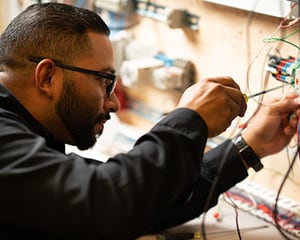Electrical Technology Program Launches at Ontario Campus
 Three things are driving the hot career choice of Electrical Technology (ET): Solar energy development, electric cars’ growing popularity, and a robust economy that sees home construction and business expansion on the rise.
Three things are driving the hot career choice of Electrical Technology (ET): Solar energy development, electric cars’ growing popularity, and a robust economy that sees home construction and business expansion on the rise.
“From the moment we wake up, electricity touches everything in our lives,” says Jim DeBerry, Electrical Technology program instructor at the Ontario campus. “It’s a growing industry, and employers are just waiting for our first Electrical Technology students to graduate.”
Those Electrical Technology students start their new 9-month certificate program in early 2017. The evening classes are Monday-Thursday from 5:30 to 10:30 p.m. The evening program accommodates those who are employed but want to invest in their education and training to make the move into this in-demand field.
What Do Electricians Do?
Electricians install, maintain and repair electrical power, communications, lighting and control systems in homes, businesses and factories. They service hardware and wiring, operate PLCs, motors, and variable speed drives, troubleshoot problems and bend pipe to run wiring for industrial, commercial and residential units.
Their indoor/outdoor work sites include new construction and tenant improvements. In industrial settings: Oil refineries, solar/power plants, wind generation, and green technologies. In commercial settings: Malls, hospitals, military facilities, business centers, big box stores and restaurants. And in residential settings: Single-family homes and apartments/condos, to name a few.
Who Should Enroll in the Electrician Program?
The Electrical Technology program is ideal for those who are goal-oriented, like to work with their hands and enjoy working with a team. The electrician field is also high on the list of those who want to work as an independent contractor or start their own business. 10 % of electricians are self-employed, according to BLS data from 2014.
“Scott Trenchard, owner of ASGARD Electrical and Lighting, tells me he is excited to see us open an Electrical program and is looking forward to hiring our students,” says DeBerry. “He has now landed a new contract to do Solar installations throughout California. He is also sending one of his employees to us to be trained.”
What Will SJVC’s Electrical Technology Students Learn?
SJVC’s Electrical Technology students can expect to learn the necessary skills to become successful, including electrical conduit bending, commercial and industrial wiring, incorporating techniques of programmable logic controllers/industrial electronics, troubleshooting, and problem-solving exercises.
Upon completing the Electrical Technology program, students are prepared to sit for the California General Electrician’s Certification Exam (also known as, Journeyman’s test). The first-time fee for this exam is paid for by SJVC.
“The best thing about this program is the certification process and the ability we have to give our students years of technical knowledge in less than a year,” says DeBerry. “We don’t waste their time with unnecessary curriculum; the Electrical Technology program is accelerated to include the most pertinent parts of every aspect of this industry, in order for our graduates to secure top employment.”
Electrician Career Outlook
Employment of electricians is projected to grow 14% from 2014 to 2024; much faster than the average for all occupations, according to the Bureau of Labor Statistics (BLS). As homes and businesses require more wiring, electricians will be needed to install the necessary components. The job prospects for electricians should be very good, as many employers report difficulty finding qualified applicants.
Earning potential is also a draw to those interested in becoming an electrician. The BLS reports that 11,640 electricians in the Los Angeles/Long Beach/Glendale, CA area earn an average of $29.84/hour, or $62,080 annually. The state of California lists 55,580 electricians earning $32.19/hour, or $66,905 annually, on average.
“We are about 75,000 electricians short in the state of California,” says DeBerry. “There is an absolute need, demand is high and every student who wants to go to work should find work fairly easily.”
Jim has been in the electrical industry since the mid-1970s, and has watched it accelerate in recent years with the advent of solar energy and electrical cars. His work experience is extensive. “I have had the privilege of designing four nuclear power plants, spent 5 years on nuclear submarines and have taught electrical technology for 8 years at the college level,” says DeBerry.
“At SJVC, we will be able to put out first-level management training for fast-rise potential for individuals with this education and training under their belts,” he says.
Ontario Electrical Technology students will learn a good deal more than what they find in their books with Mr. DeBerry at the head of the class.
You might also like
More stories about
Request Information
All fields using an asterik (*) are required.


